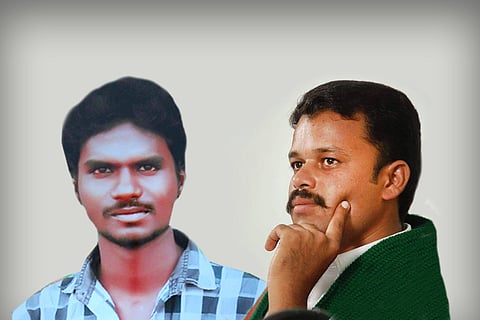

The sentencing of Yuvaraj, president of Dheeran Chinnamalai Peravai, a Kongu-Vellalar caste-based outfit, and nine others from the community, for the murder of Gokulraj, a 21-year-old Dalit youth in 2015, has been welcomed by anti-caste activists and progressive political organisations, who want an end to caste-based violent crimes in the state.
The verdicts bring hope for many as convictions in murder cases related to caste in Tamil Nadu are quite low. In 2021, Evidence, a Madurai-based Rights organisation, had brought out a five-year report on caste motivated murders in Tamil Nadu. The report revealed dismal statistics: between 2016 and 2020, 300 SC/ST persons were killed in the state. But only 13 convictions had taken place in the same period. In 30 cases, the accused were acquitted and in the remaining 257, the trials were pending at the courts for many years or still at the investigation stage.
Vanni Arasu, deputy general secretary of the Viduthalai Chiruthaigal Katchi (VCK), said it is noteworthy that this sentence has been pronounced on International Womens’ Day. “Fundamentally, caste crimes are an attempt to keep women under control and prevent them from marrying outside the caste. The verdict strengthens the rights of women, and is proof that those who carry out caste killings cannot get away with their crimes. It’s a warning to such people,” he said. Vanni Arasu also said advocate Papa Mohan, who represented Gokulraj’s family, deserves appreciation. “He stood his ground despite intimidation, argued the case with great clarity and won. I offer my congratulations to him.”
A special sessions court in Madurai pronounced the verdict on March 8. Yuvaraj, the prime accused, and Arun, the second accused, have been sentenced to life imprisonment on three counts. Though the court convicted ten out of the seventeen accused on March 5, the sentencing was pronounced on Tuesday.
The VCK leader said, in 2015, there were attempts to treat Gokulraj’s death as a suicide and his party had carried out several protests to ensure that the case was investigatigated for what it was—a murder. “Whether it was AIADMK that was in power then or the police, they tried to close the case, claiming it was a suicide,” he alleged, A month after Gokulraj’s murder, Sankar and Kumar, who were arrested for their role in the murder, had confessed to the crime. Before killing Gokulraj, the accused had coerced him to record a video and write a suicide note. The accused had shared the same on social media, in an attempt to change the narrative.
Some actvists were cautious in celebrating the verdict because of the possibility of it being overturned through an appeal in a higher court. “This is a welcome verdict,” says Kovai Ramakrishnan, president of the Thanthai Periyar Dravida Kazhagam (TPDK). “It was a horrific case of caste-based murder. It is likely that Yuvaraj’s side will appeal the conviction in a higher court. The state government has to ensure that competent prosecutors are appointed so that the verdict isn’t overturned.” The need to bring in a state legislature that will tackle ‘honour’ killings, has also been raised.
Yuvaraj and his organisation took issue with the friendship between Gokulraj and Swathi, a Kongu Vellalar woman and his classmate. Gokulraj was abducted from a temple and tortured and his headless body was later found from a railway track.
Rajendran, general secretary of the Dravida Viduthalai Kazhagam (DVK), said Gokulraj’s murder was an atrociously violent act. “Gokulraj and Swathi were just friends. Not only did Yuvaraj kidnap Gokulraj, torture him and behead him, he released videos on WhatsApp as if to mock the police while he was on the run. Initially, the police were progressing with extreme restraint. It was only after the protests that happened across the state that they started taking adequate measures to investigate,” he said.
He added that the manner in which the trial was carried out initially is a matter of shame for Tamil Nadu and that the conviction would have been difficult if Gokularaj’s mother had not taken efforts to transfer the case from a court which initially heard the case. “It is essential that the state government pass a specific law against such caste-based murders,” Rajendran said. It’s a demand that has already been raised multiple times, most recently by the VCK, CPI(M) and the CPI in 2021, when a Vanniyar family was convicted 18 years after the double murder of an inter-caste couple in Cuddalore district. The case refers to an incident in which Kannagi (Vanniyar) and Murugasan (Dalit) were abducted and poisoned by the family and their bodies burnt in full public view of the village. Vanniyars are considered Most Backward Class but are dominant in pockets of northern Tamil Nadu.
“There is a distinct difference between this particular murder and other cases of caste-based murders,” says Kathir, founder of Evidence. According to him, usually, the murders are carried out by the family, motivated by caste pride. “But in this case, Yuvaraj and his outfit Dheeran Chinnamalai Peravai got involved directly. This is an atrocity carried out by a caste-based organisation. This is similar to the criminal activities by Khap panchayats witnessed in North India,” adds Kathir. The trial in the case came up before the SC/ST special court in Madurai only in 2019. “What the state government needs to do is ensure that an expert argues the case when the convicts appeal the sentence in a higher court. The appeal will certainly happen. The chances of Yuvaraj being acquitted during an appeal hearing is high,” Kathir said.
Yuvaraj’s brother-in-law Thamarai said they are planning to challenge the verdict and claimed that the case against Yuvaraj was fabricated. Pa La Anand, a Karur-based lawyer who had appeared for Yuvaraj in the intial days of the case said: “This is only a trial court’s verdict. It’ll be the High Court that will decide whether this is correct or not.”